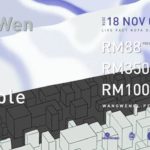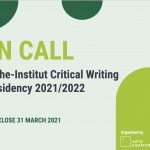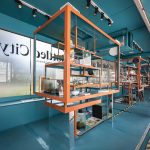Untitled
2022 - Painting (Painting)
40 x 60 cm
Tirdad Hashemi
This untitled painting by Tirdad Hasemi presents a space that can be thought of as both a prison cell and a house. Paradoxically, in both cases the color and the importance of the walls give a feeling of confinement. Escaping from prison in Iran and finding the walls of a home in Europe has been a complex and conflicting experience for Hashemi. When they arrived in Berlin, they lived in a communal apartment which, over time, became a place where conflicts arose. However, this is one of the ways in which they can create links with the new context in which they have arrived. On the right side of the painting, Hashemi depicts a pile of suitcases that remind us of their travels in different European cities. The size of the painting is itself a sign of the nomadic life they have led for several years. It is also a way to reinforce the idea of oppressive confinement.
Leaving Iran in 2017, Tirdad Hashemi now cultivates perpetual movement, between their hometown of Tehran, Istanbul, Paris, and Berlin. They started painting in order to express things that cannot be formulated verbally. Hashemi’s representations are based on everyday life, their own, and that of their friends in exile. They have chosen the medium of drawing or small format paintings in order to be able to create wherever they are without any material constraints. Hashemi’s work expresses the singularity and the harshness of their mutable lifestyle. Emotional and political stories overlap in their works that give form to depression, the homesickness of their exiled friends, and melancholy. For Hashemi, intimacy is a collective matter, meant to be shared. They have made incompleteness a modality of their style, their drawings often being sketched quickly and as if left to their own fate. Hashemi’s practice has since expanded to include hands other than their own; while in residence at the B.L.O. studio in Berlin, they began collaborating with Soufia Erfanian.
Colors:
Related works sharing similar palette

© » KADIST
Sandra Monterroso
2023Presented as part of a recent group of works titled The Paradox of Healing, Rhombus for Healing No...

© » KADIST
Karen Lamassonne
1989Ventana indiscreta (Rear Window) by Karen Lamassonne takes its title from Hitchcock’s renowned 1954 classic...

© » ARTS EQUATOR
Weekly Picks: Malaysia (12–18 Nov 2018) | ArtsEquator Thinking and Talking about Arts and Culture in Southeast Asia Weekly To Do November 12, 2018 Bisikan Monsoon — Open Rehearsal , at Selangor & KL Kwang Tung Association, 13 Nov, 5:30pm An invitation to view the rehearsals for Kwang Tung Dance Company’s Bisikan Monsoon (the show is travelling to China later in the month)...

© » ARTS EQUATOR
Open Call for AE x Goethe-Institut Critical Writing Micro-Residency 2021/2022 | ArtsEquator Thinking and Talking about Arts and Culture in Southeast Asia ArtsEquator Viewpoints March 12, 2021 ArtsEquator and Goethe-Institut Singapore are pleased to announce the launch of the inaugural AE x Goethe-Institut Critical Writing Micro-Residency 2021/2022 ...

© » LENS CULTURE
Living in the Transition - Photographs by Shunta Kimura | Text by Magali Duzant | LensCulture Award winner Living in the Transition Traveling through Gabura Union in Bangladesh, Shunta Kimura documents impact, adaptation, and resilience in his quiet photographs of everyday life on the frontlines of rapid climate change...

© » KADIST
Jakob Kudsk Steensen
2018The virtual reality work Aquaphobia by Jakob Kudsk Steensen examines it’s title subject matter – the fear of water...

© » KADIST
Subash Thebe Limbu
2021In Ningwasum , Subash Thebe Limbu explores Adivasi Futurism, a concept he has developed over a number of years, inspired by the writings of Octavia Butler, Afrofuturism, Indigenous Futurism, and various Adivasi, Janajati, feminist, queer, and Dalit movements...

© » HYPERALLERGIC
AI Artwork Projected on Historic Gaudí House Draws Nearly 100K People Skip to content Sofia Crespo, "Structures of Being" (2024), projection mapping at Casa Batlló (photo by Claudia Maurino, courtesy Casa Batlló) BARCELONA — Architect-designer Antoni Gaudí, legend of Catalan Modernisme, is often quoted as having said, “Nothing is invented, for it’s written in nature first.” Whether or not that’s apocryphal, his legacy suggested something holier than human at work...

© » KADIST
Dread Scott
2022In conjunction with his first NFT sale of White Male Dread Scott made and circulated a poster titled Whites For Sale ...

© » KADIST
Bady Dalloul
2017The Great Game is a series of works composed of a number of card combinations illustrated by the faces of key political figures shaping the geopolitical landscape in the Middle East...

© » KADIST
Alexis Smith
1995In 8 Ball Surfboard (1995),Alexis Smith combines her long-term interests in California culture and conceptual assemblage...

© » KADIST
Marcelo Cidade
2006This series of photographs reflects Marcelo Cidade’s incessant walks or drifting through the city and his chance encounters with a certain street poetry like the Surrealists or Situationists before him...

© » KADIST
Kelly Sinnapah Mary
2021Notebook 10 , l ‘enfance de sanbras (The Childhood of Sanbras) series by Kelly Sinnapah Mary is a sequel to an earlier series by the artist titled Cahier d’un non retour au pays natal (2015)...







